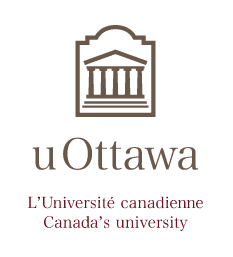 |
(CRM-, Joint-) ColloquiumFridays 3:30pm, Room B005,
Supported by |
 |
(CRM-, Joint-) ColloquiumFridays 3:30pm, Room B005,
Supported by |
Coffee: Common Room, before the colloquium at 3pm.
(Carleton-uOttawa transportation information)
Please see below for more details on both talks and speakers:
TITLE: Random walk, percolation and interacting diffusions in an ultrametric setting.
SPEAKER: Don Dawson, Carleton University
ABSTRACT: Spatial stochastic models have been intensively studied in Euclidean spaces for many years. Recently the analogous questions have arisen naturally in a class of ultrametric spaces and the question of the relations between these two settings have been investigated. In this lecture we introduce these ideas and briefly describe recent joint research projects with Luis Gorostiza and Andreas Greven in this area. This includes a brief outline of a program motivated by some open problems on the scaling limits of a class of interacting diffusions.
SHORT BIO: Donald Dawson received his B.Sc.(Hon.) in Mathematics and Physics from McGill University in 1958 and his doctorate from MIT in 1963. He taught at McGill from 1963-1970. He has been a member of the School of Mathematics and Statistics at Carleton since 1970 and was appointed Professor Emeritus and Distinguished Research Professor in 1999. He served as Director of the Fields Institute from 1996-2000 and as the President of the Bernoulli Society for Mathematical Statistics and Probability for 2003-2005.
He is a Fellow of the Royal Society of Canada, Institute of Mathematical Statistics, International Statistical Institute, Royal Society (London) and American Mathematical Society. He received a Gold Medal from the Statistical Society of Canada in 1991, a Max Planck Award of the for International Cooperation from the Humboldt Foundation in 1996, the CRM-Fields prize in 2004 and Dr. Sci. from McGill University in 2005.
His research interests include probability and stochastic processes and their applications to complex systems, statistical physics, genetics and evolutionary biology. He has published over 100 scientific papers and 8 monographs and has supervised 27 Ph.D. students and 30 postdoctoral fellows.
TITLE: Norming the infinitesimals of large fields
SPEAKER: H. G. Dales, Lancaster, England
ABSTRACT: We introduce some large ordered fields and ask whether one can put an algebra norm on the subalgebra of infinitesimals of the field. In particular we shall introduce a 'grown-up version of the real line'. We shall explain a connection with a the following question of Kaplansky: Let K be a compact space, and let C(K) denote the Banach algebra of all continuous functions on K. Are all homomorphisms from C(K) into a Banach algebra automatically continuous? To answer this we shall discuss prime ideals in the algebras C(K), and the 'super-real fields' that are built from them.
In fact Kaplansky's question is independent of ZFC; we shall explain what this means. Indeed many innocuous-looking queries about the family of prime ideals in algebras of continuous functions turn out to be tangled with questions within set theory.
Full details of the proofs are contained in the following books: H. G. Dales, Banach algebras and automatic continuity, OUP, 2000; H. G. Dales and W. H. Woodin, Super-real fields: totally ordered fields with additional structure, OUP, 1996.
SHORT BIO: Prof. H.G. Dales is among the world's leading researchers in functional analysis, in particular Banach algebra theory, and related disciplines. He has more than 80 publications to his record, counting well over 1,000 citations.
Dales was a scholar at Queens' College, Cambridge, England, obtaining a PhD in 1970. He spent most of his career at the University of Leeds, England, interspersed with several year-long visits to the University of California at Berkeley and Los Angeles, where he worked with Bill Bade and Phil Curtis. He is now semi-retired and holds a part-time sinecure at the University of Lancaster in north-west England.
Dales is the author of the 900+ pages book "Banach algebras and automatic continuity" (2000), which has quickly become a standard reference in the field, and of two books with W.H. Woodin, now of Harvard, that seek to persuade analysts of the great importance of set theory.
Dales is currently Vice-Chair of the Ethics Committee of the European Mathematical Society, and has written articles on "Open access".